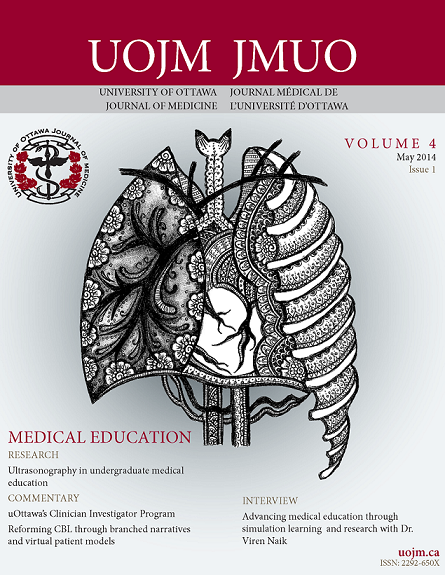The advancement of medical education through innovative research and simulation learning: A discussion with Dr. Viren Naik, medical director of the University of Ottawa’s Skills and Simulation Centre
DOI :
https://doi.org/10.18192/uojm.v4i1.1032Mots-clés :
medical Education, undergraduate, curriculum, simulationRésumé
A B S T R A C T
The spotlight of UOJM’s 4th issue is medical education. We met with Dr. Viren Naik, anesthesiologist, associate professor at the University of Ottawa (uOttawa), and Medical Director of the University of Ottawa Skills and Simulation Centre (uOSSC). He is also a core team member of the Academy of Innovation in Medical Education (AIME), uOttawa’s centre for advancing medical education research. Dr. Naik is actively involved in research, with over 60 peer-reviewed publications and grants. He was also the previous chair of the Written Examination in Anesthesia with the Royal College of Physicians and Surgeons of Canada. In this interview, we discuss the advancement of medical education with the skills and simulation centre, the future of the medical curriculum, and how to be involved in medical education as students.
R É S U M É
Dans cette 4e édition du JMUO, le sujet mis en lumière est l’éducation médicale. Nous avons rencontré le Dr Viren Naik, anesthésiologiste, professeur agrégé de l’Université d’Ottawa (uOttawa) et directeur médical du Centre de compétences et simulation de l’Université d’Ottawa (CCSUO). C’est aussi un membre important de l’Académie pour l’innovation en éducation médicale (AIME), le centre de l’Université d’Ottawa qui a pour but de faire avancer la recherche en éducation médicale. Dr Naik est un chercheur très dynamique qui a plus de 60 publications et subventions évaluées par les pairs à son actif. Dans le passé, il a aussi présidé l’examen écrit en anesthésiologie du Collège royal des médecins et chirurgiens du Canada. Durant l’entrevue, nous avons discuté de l’avancement de l’éducation médicale au Centre de compétences et simulation, de l’avenir du cursus médical et de la façon que les étudiants peuvent participer à l’éducation médicale.
Références
2. Bould MD, Naik VN. Teaching how to expect the unexpected: improving the retention of knowledge for rare clinical events. Canadian Journal of Anesthesia. 2009;56:14-18.
Téléchargements
Publié-e
Numéro
Rubrique
Licence
- Les auteurs qui publient dans le JMUO gardent les droits d’auteur de leurs articles, incluant tous les brouillons et la copie finale publiée dans le journal
- Bien que le JMUO n’a pas les droits d’auteur des articles soumis, en acceptant de publier dans le JMUO, les auteurs donnent le droit au journal d’être les premiers à publier et à distribuer leurs articles.
- Par la suite, les auteurs peuvent soumettre leurs documents à d’autres publications, incluant des revues ou des livres, avec un remerciement de leur première publication dans le JMUO
- Des copies du JMUO seront distribuées à la fois sous format papier et en ligne, et tous les matériaux seront accessibles au public en ligne. Le journal n’a pas de responsabilité légale par rapport à la distribution publique du contenu.
- Prière de vous assurer que tous les auteurs, les coauteurs et les investigateurs
- Le contenu est rendu disponible sous licence Creative Commons Attribution - Pas d'Utilisation Commerciale - Pas de Modification 4.0 International.


